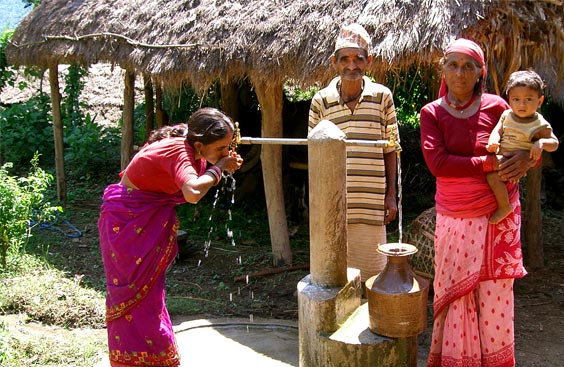
Multiple Use Water System in Nepal. (Photo: IDE)
In sub-Saharan Africa, improved access to water means more than simply basic survival for families dependent on agriculture for both food and income. It means the difference between barely scraping by and eating balanced meals, affording education, and owning a home.
In Zambia, the majority of children drop out of school by the seventh grade because their families can no longer afford it. But Peter Chakanyuka and his wife are able to pay “school fees every three months for our six children,” thanks to a treadle pump the family purchased with the help of International Development Enterprises (IDE), an organization working to improve the livelihoods of farmers in Asia and Africa through improved agricultural technology and market access. “Our life is much better and we eat more food variety than before,” says Mrs. Chakanyuka. (See also: Innovation of the Week: Getting Water to Crops)
In Nepal, IDE found that installing Multiple Use Water Systems (MUS) reduced the labor needed for water collection, improved sanitation, and empowered women. The systems collect water from springs and deliver it downhill using gravity to a domestic water tank and separate irrigation tank. The tanks provide a consistent source for water for drinking, cooking, and bathing, as well as a shared water source for irrigation.
As in many sub-Saharan Africa countries, in Nepal the task of gathering water usually falls to women, and the reduced labor needed for water gathering has allowed women to become more involved in the business side of a community’s agriculture effort. Increased crop production and diversity have also improved household diets, ensuring that women and children are eating more vegetables.
Veronica Sianchenga, a farmer living in Kabuyu Village in Zambia, saw similar improvements to her family’s quality of life when she began irrigating her farm with the “Mosi-o-Tunya” (Pump that Thunders), a pressure pump that she purchased through IDE. The pump is manufactured in Zambia, creating local jobs and keeping the technology affordable for small-scale farmers. The Mosi-o-Tunya is lightweight and easily operated by both men and women and transported by foot or bike.
Explaining that her children are eating healthier, with more vegetables in their diet, Mrs. Sianchenga adds that she is also enjoying increased independence. “Now we are not relying only on our husbands, because we are now able to do our own projects and to assist our husbands, to make our families look better, eat better, clothe better—even to have a house.”